
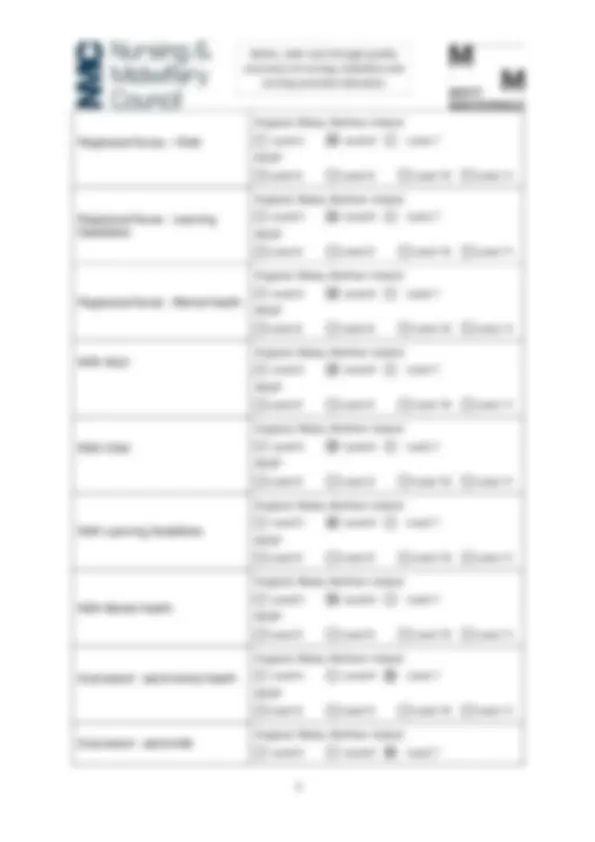
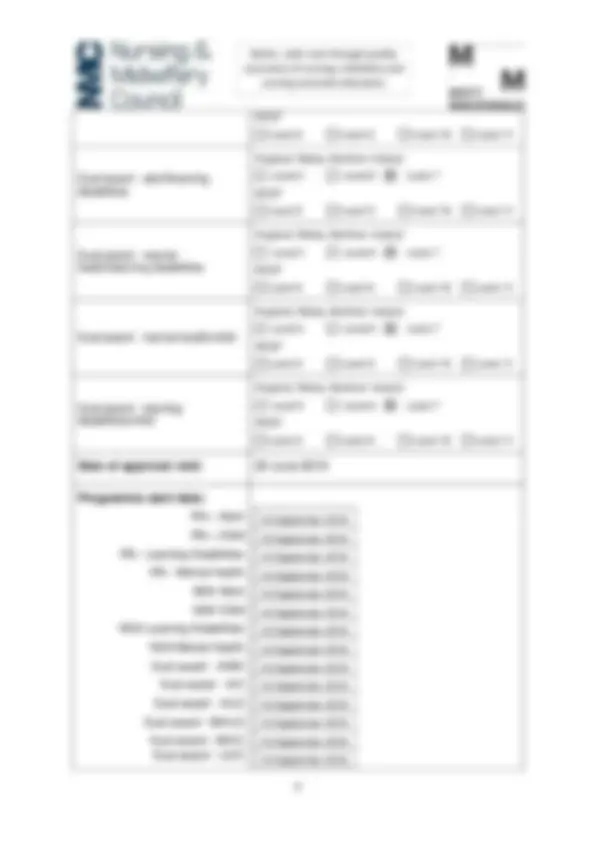
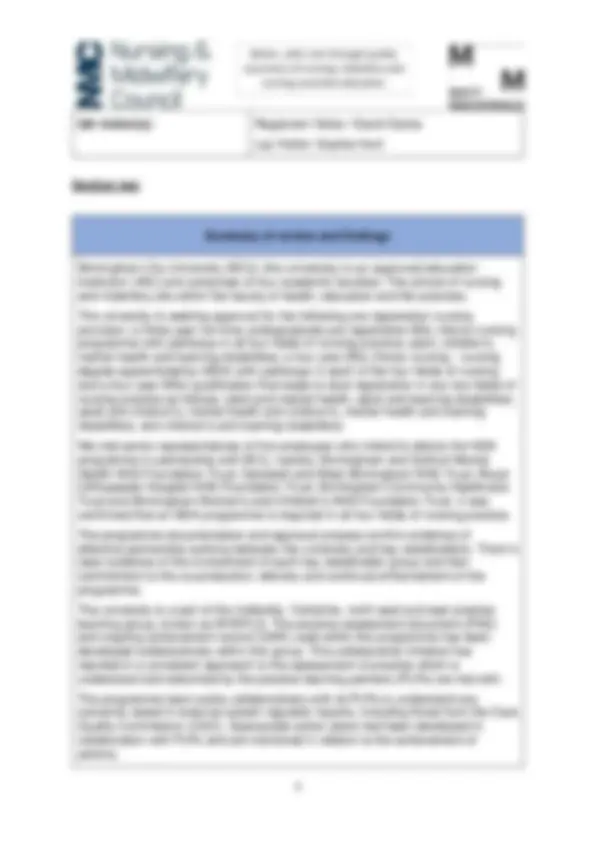
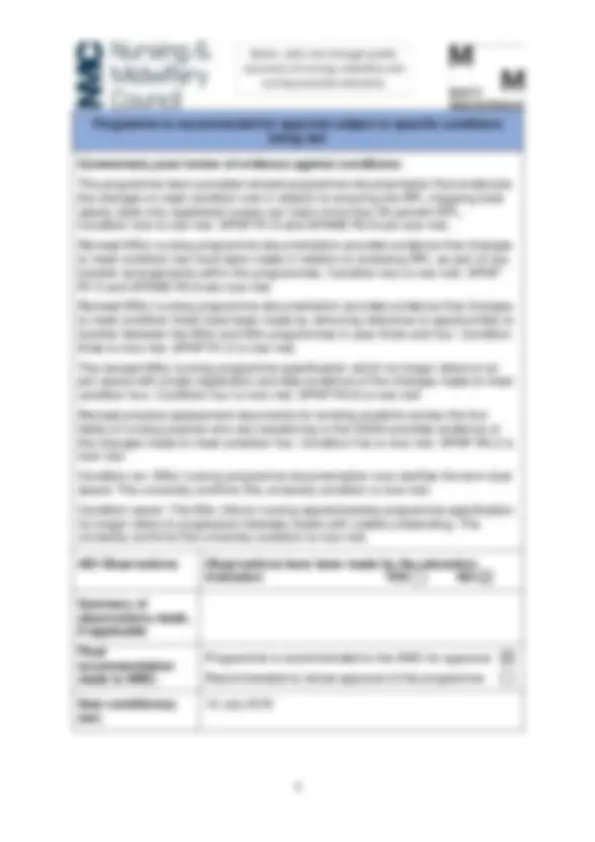
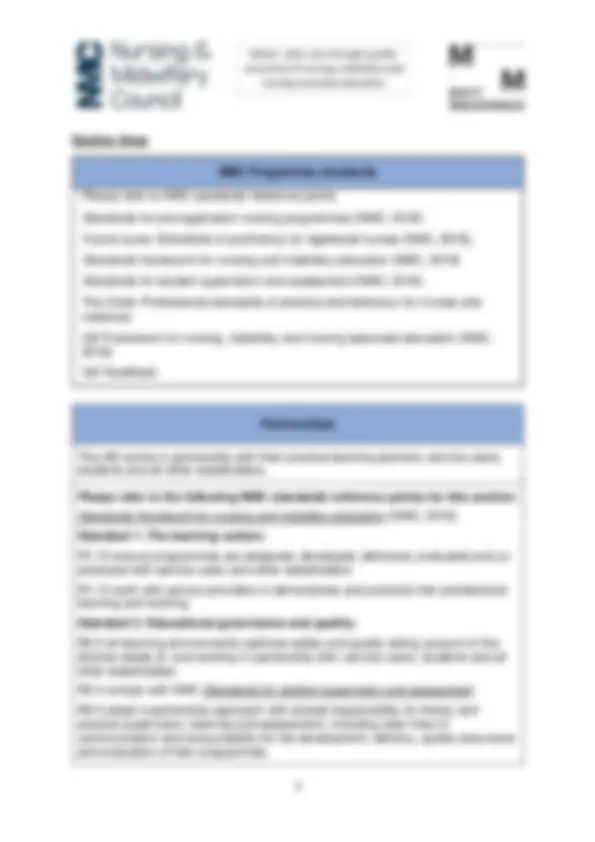
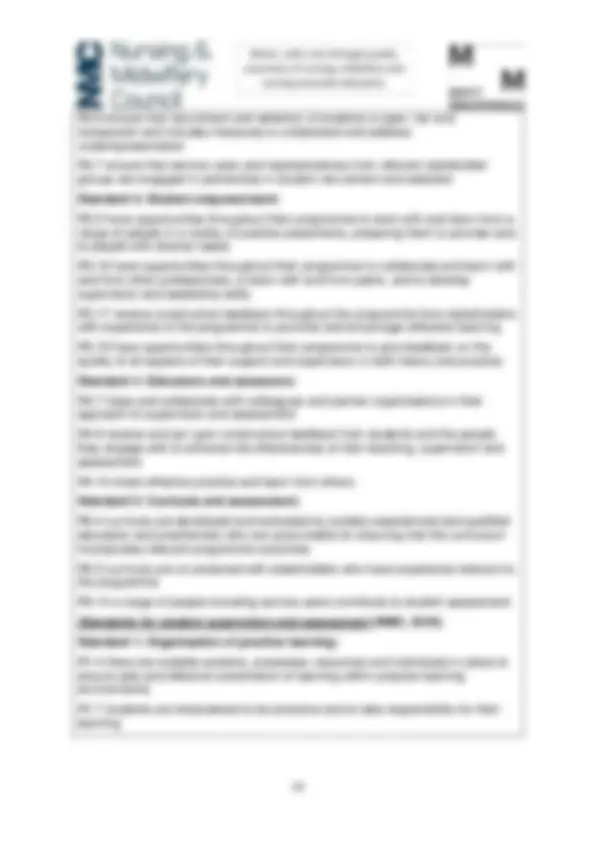
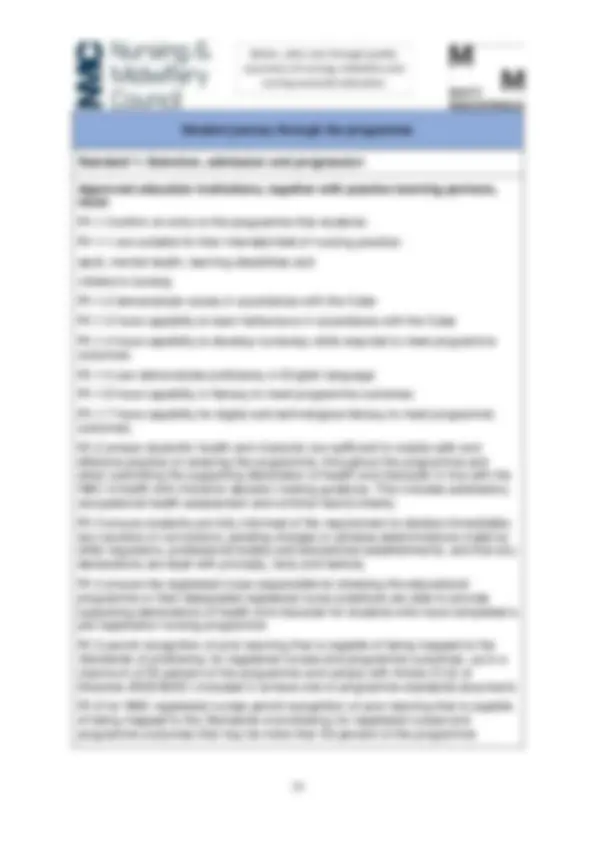
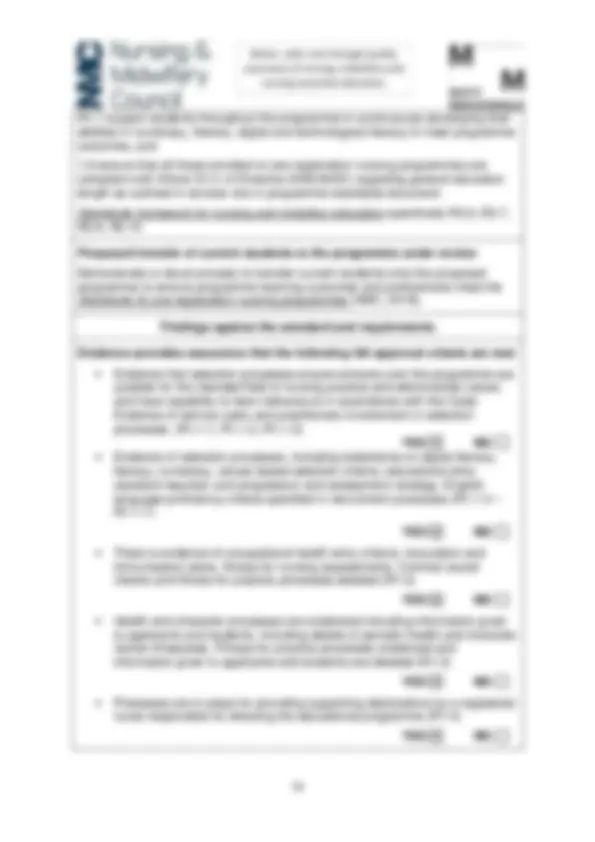
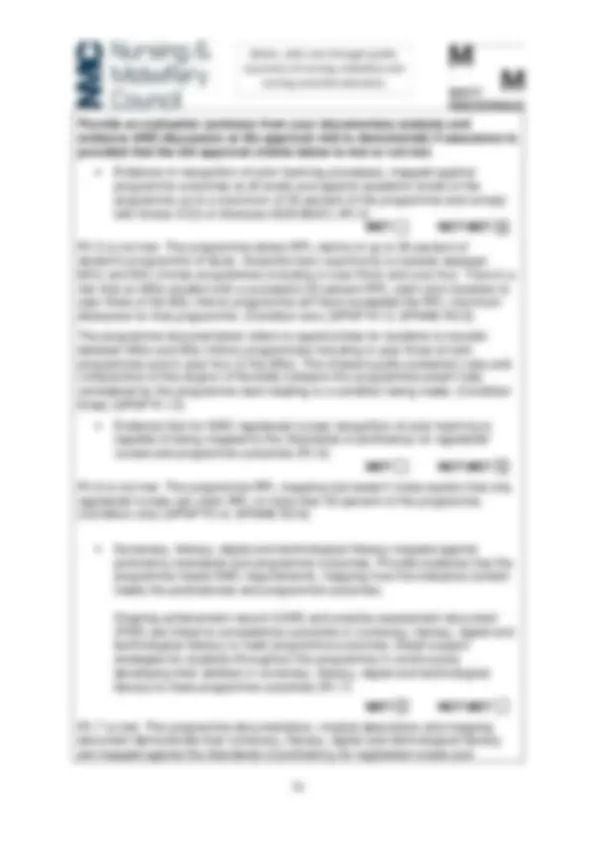
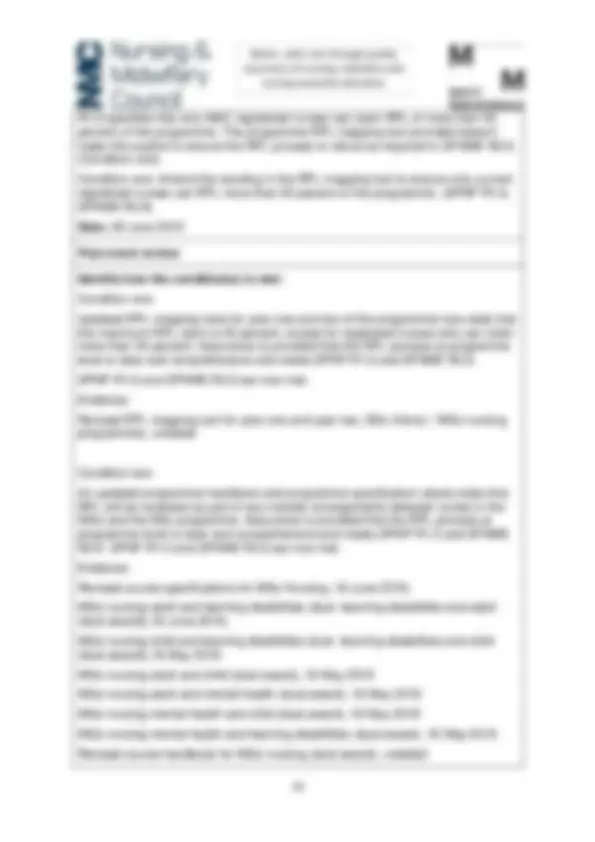
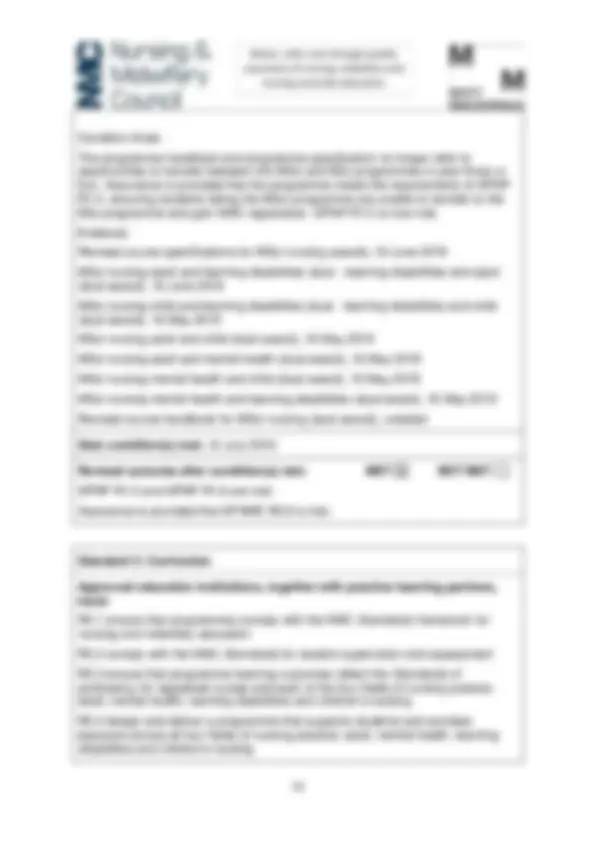
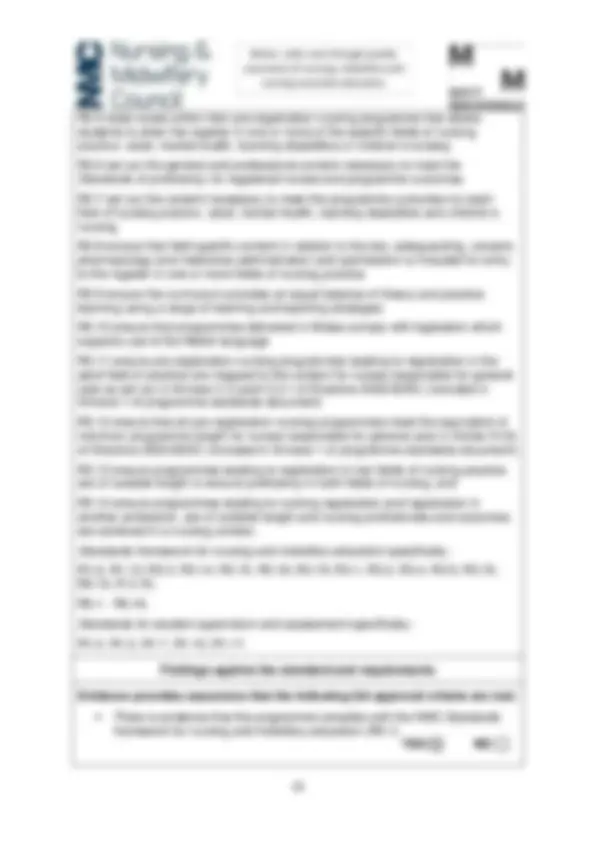
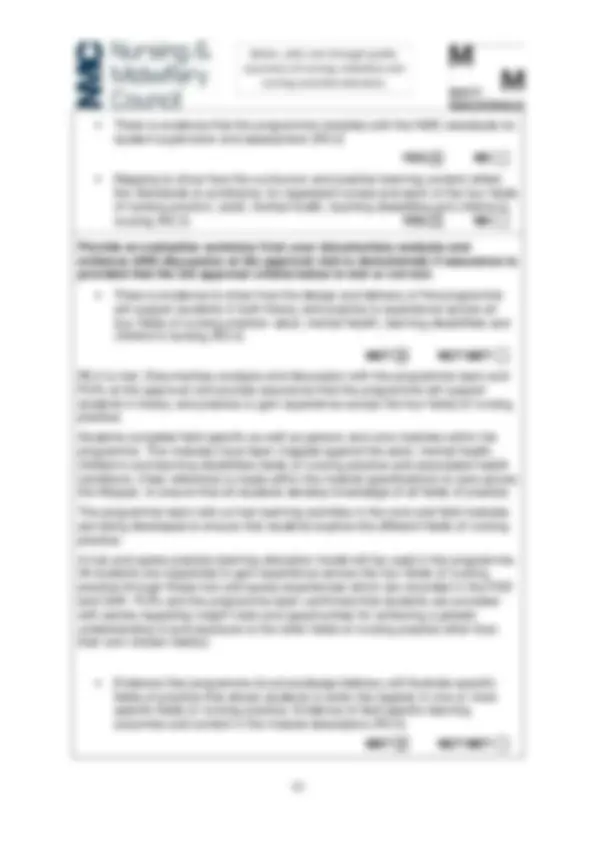
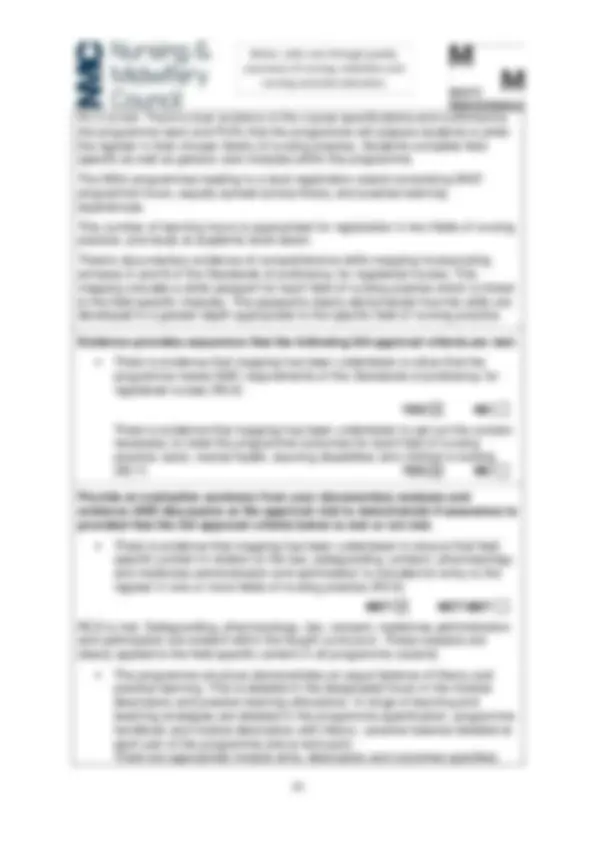
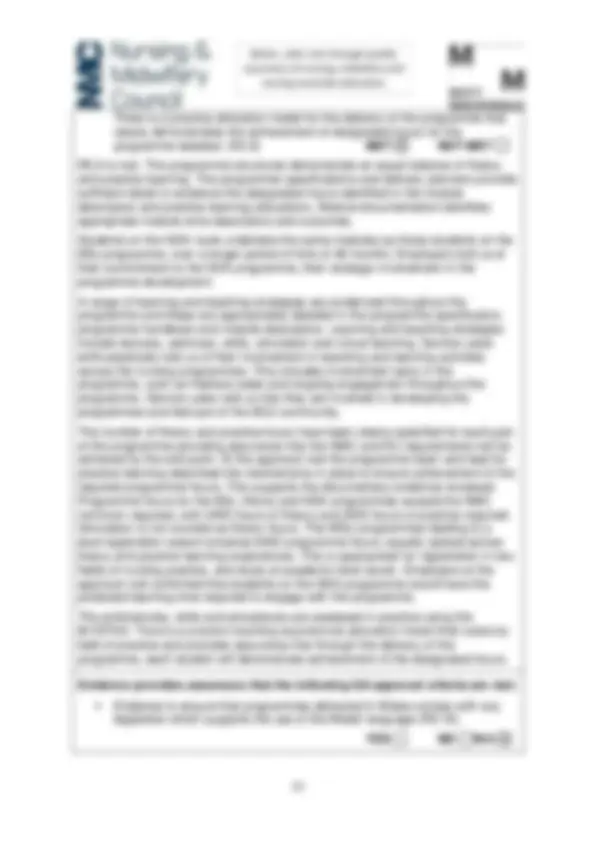
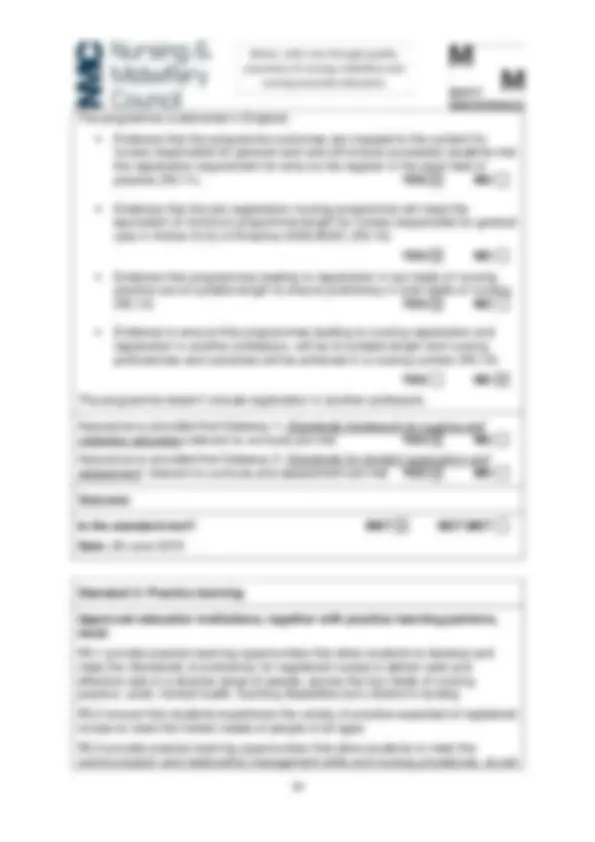
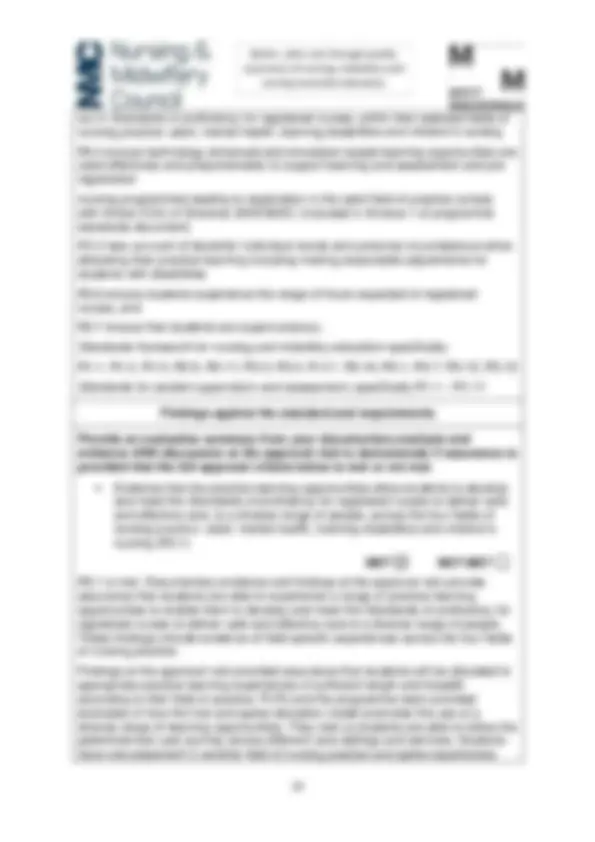
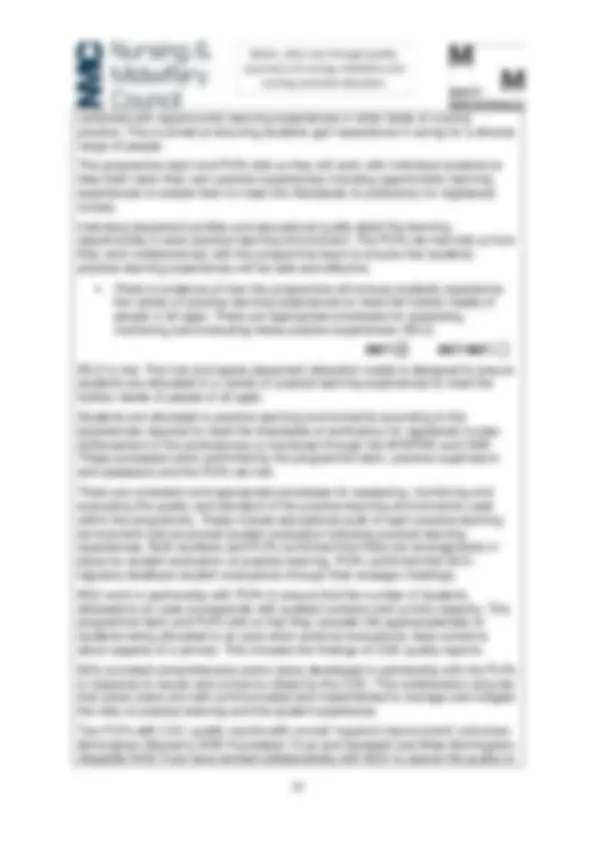
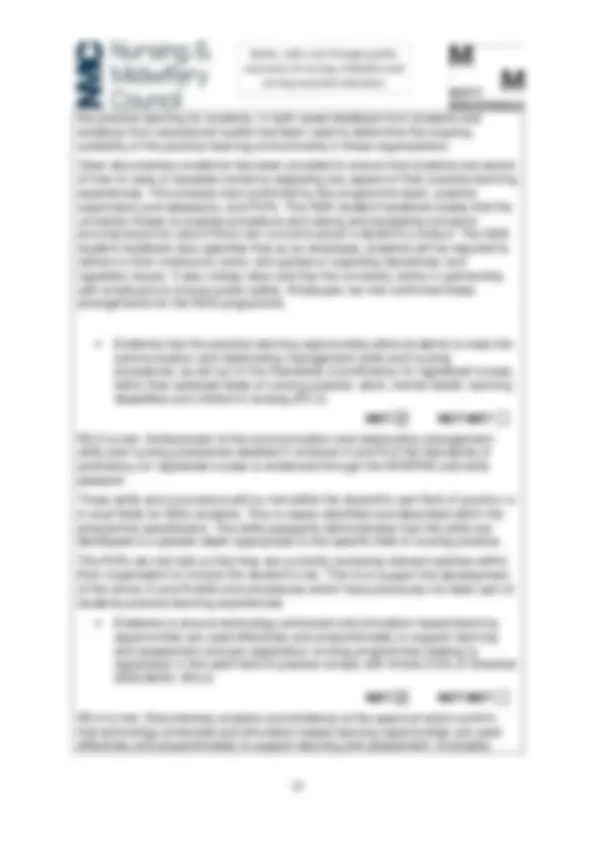
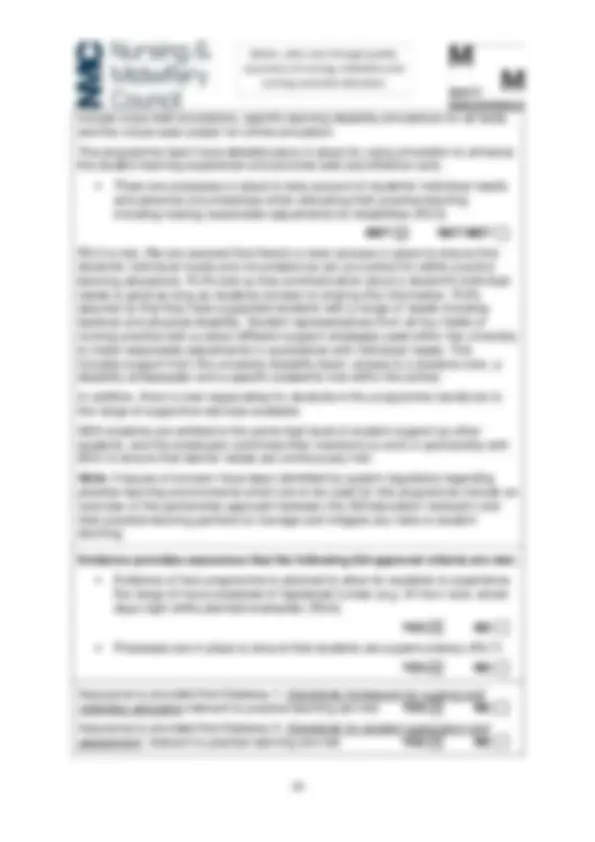
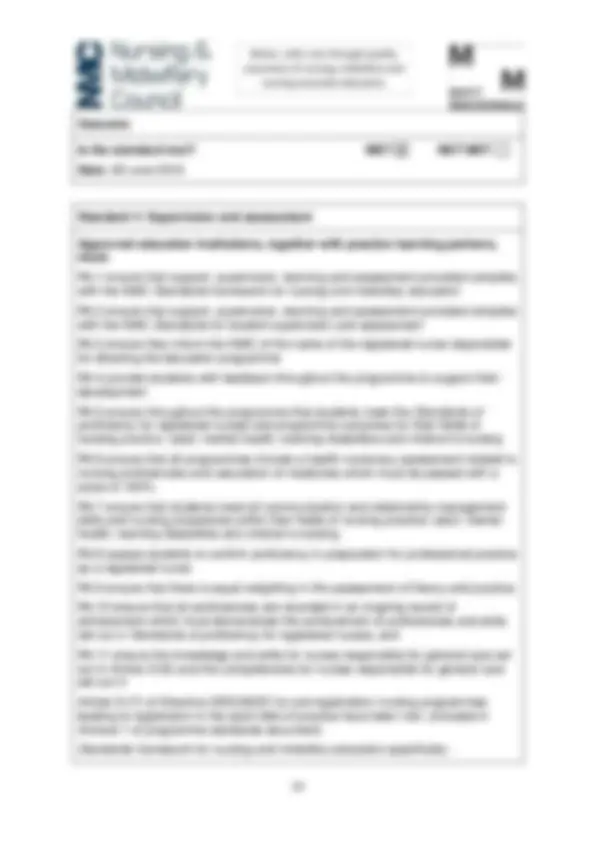
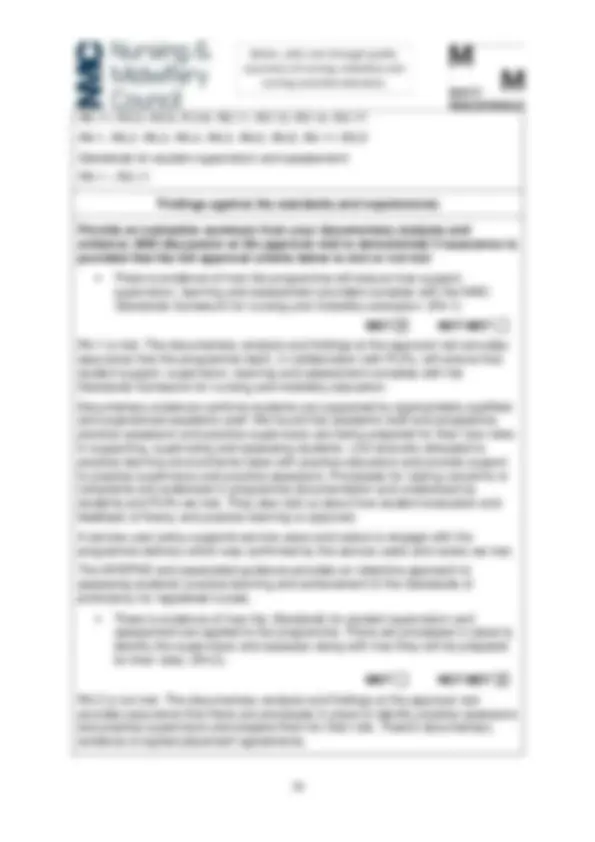
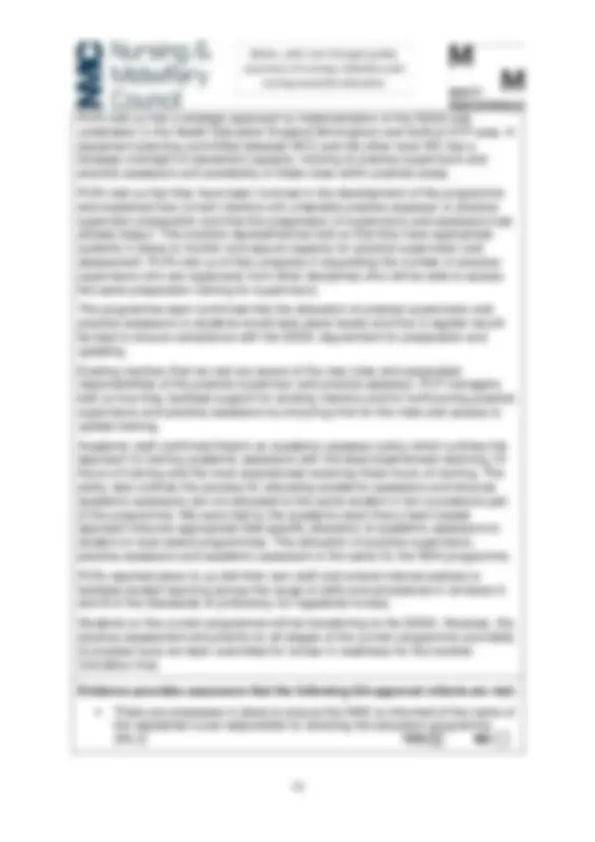
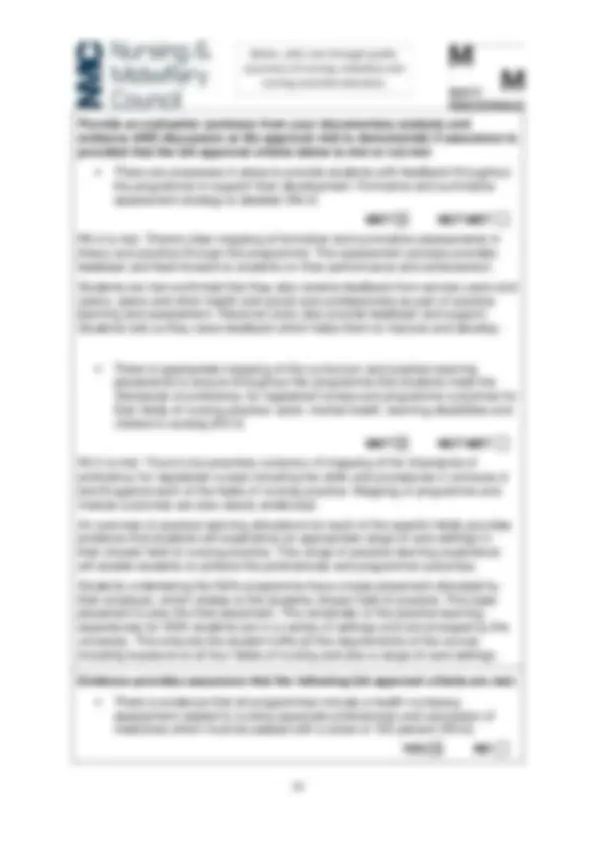
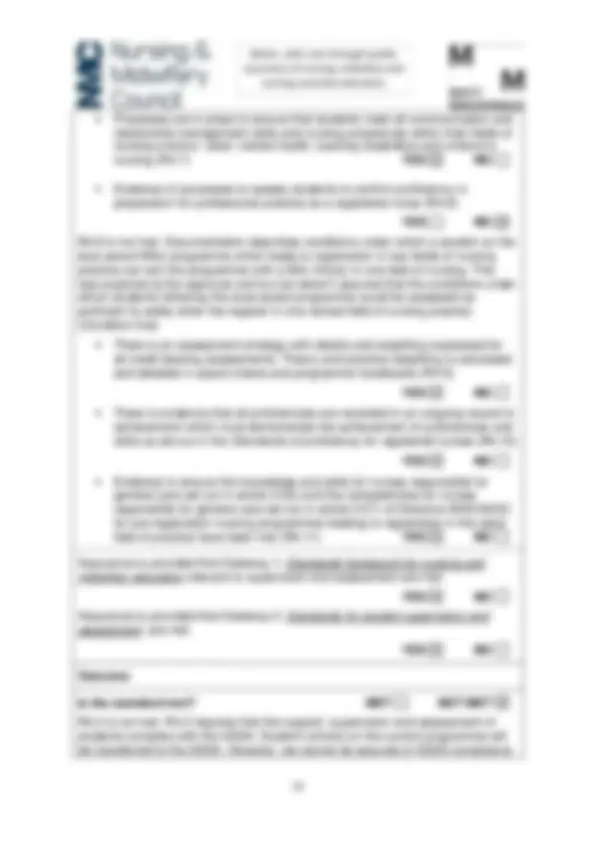
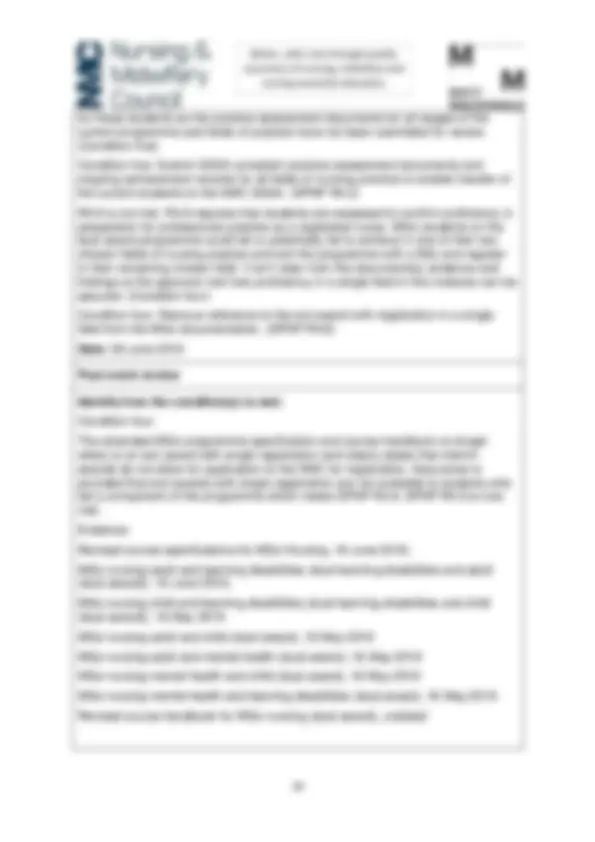
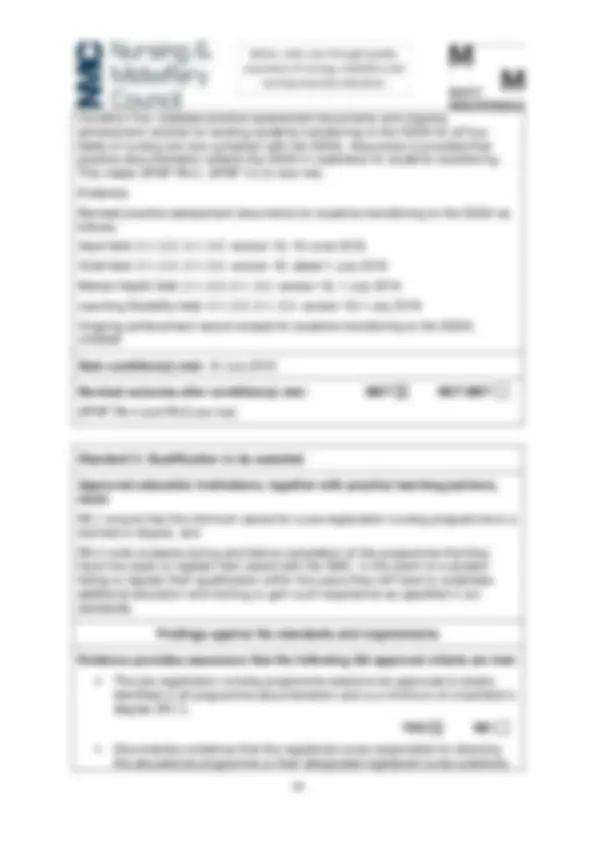
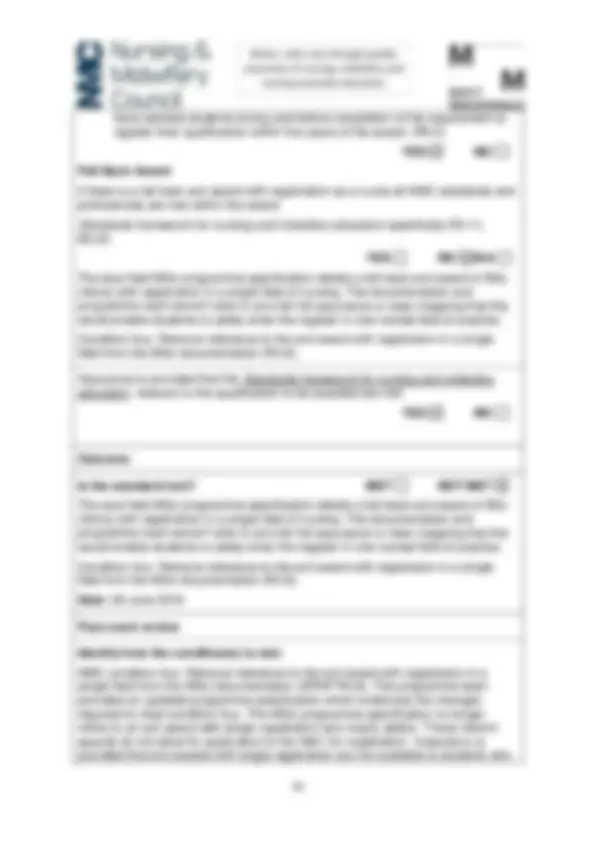
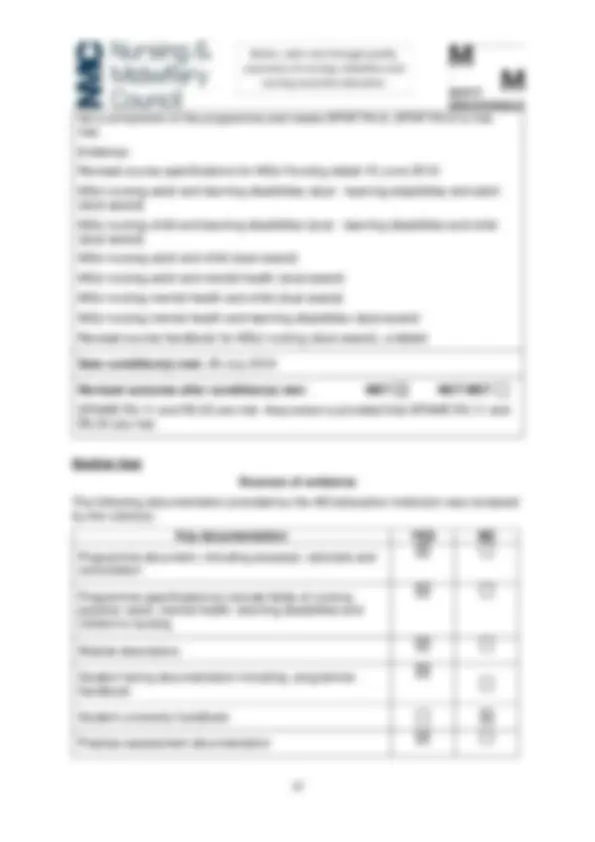
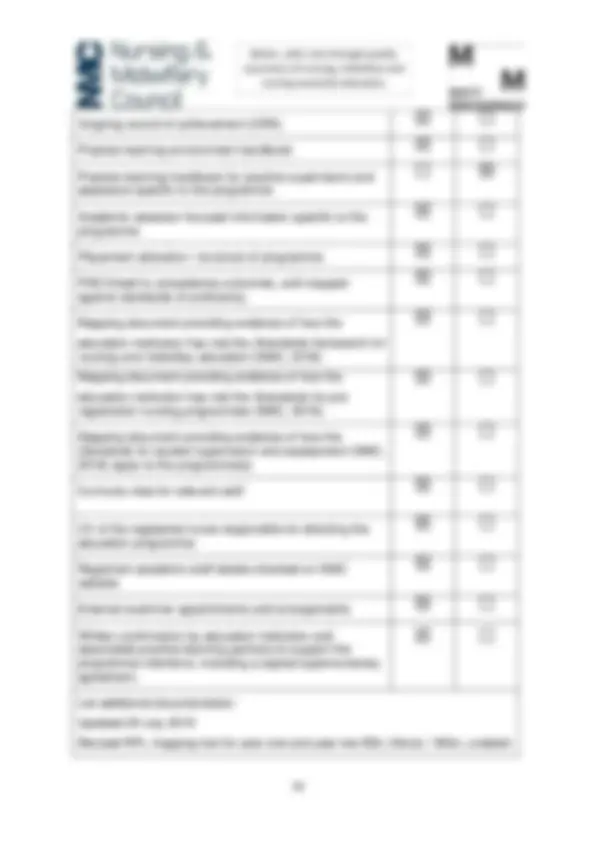
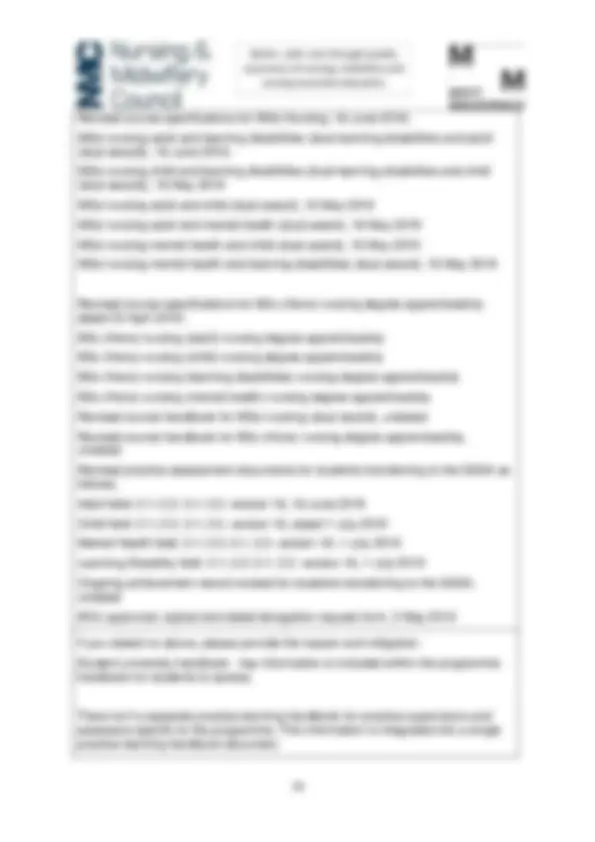
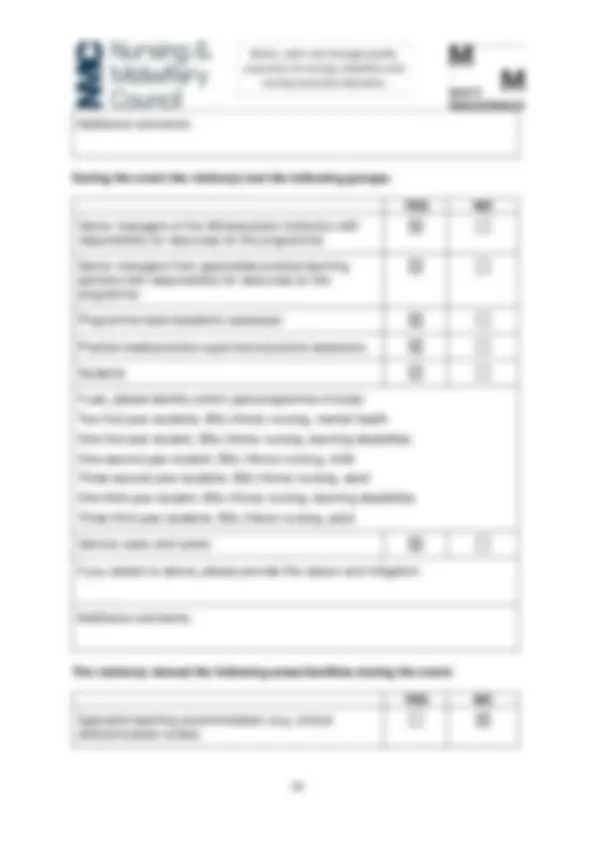
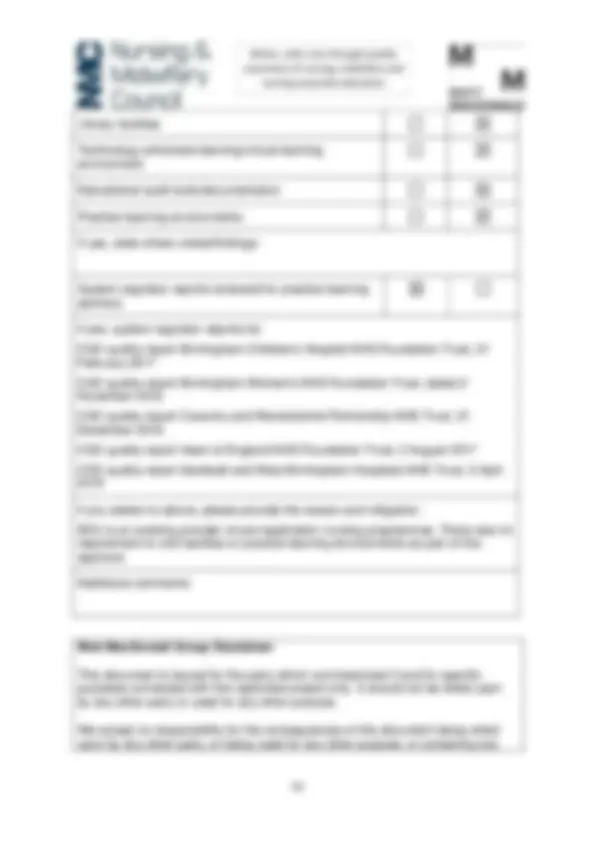



Study with the several resources on Docsity

Earn points by helping other students or get them with a premium plan


Prepare for your exams
Study with the several resources on Docsity

Earn points to download
Earn points by helping other students or get them with a premium plan
Community
Ask the community for help and clear up your study doubts
Discover the best universities in your country according to Docsity users
Free resources
Download our free guides on studying techniques, anxiety management strategies, and thesis advice from Docsity tutors
Evidence of revised MSci Nursing course specifications and handbooks from May and June 2019. The document also includes information on how these courses meet the NMC Standards for nursing and midwifery education, student supervision and assessment, and the Standards of proficiency for registered nurses in various fields of nursing practice. The document also mentions the use of technology-enhanced and simulation-based learning opportunities.
What you will learn
Typology: Slides
1 / 42

This page cannot be seen from the preview
Don't miss anything!



































Programme approval visit report
Section one
Programme provider name: Birmingham City University
In partnership with: (Associated practice learning partners involved in the delivery of the programme)
Birmingham Community Healthcare NHS Trust Birmingham and Solihull Mental Health Trust Birmingham Women's and Children's NHS Foundation Trust Black Country Partnership NHS Foundation Trust Burton Hospitals NHS Foundation Trust Heart of England NHS Foundation Trust Royal Orthopaedic Hospital NHS Foundation Trust Sandwell and West Birmingham Hospitals NHS Trust University Hospitals Birmingham NHS Foundation Trust Walsall Health Care NHS Trust Worcestershire Acute Hospitals NHS Trust Worcestershire Health and Care NHS Trust Wye Valley NHS Trust Private voluntary and independent health care providers
Programmes reviewed: ( Tick all that apply)
Pre-registration nurse qualification leading to Registered Nurse – Adult Registered Nurse – Child Registered Nurse - Learning Disabilities Registered Nurse - Mental Health
Nursing Degree Apprenticeship (NDA) route NDA Adult NDA Child NDA Learning Disabilities NDA Mental Health
Dual award - pre-registration nursing Dual award - adult/mental health Dual award - adult/child Dual award - adult/learning disabilities Dual award - mental health/learning disabilities Dual award - mental health/child Dual award - learning disabilities/child
Title of programme(s): (^) BSc (Hons) Nursing (Adult)
BSc (Hons) Nursing (Mental Health) BSc (Hons) Nursing (Learning Disabilities) BSc (Hons) Nursing (Child) BSc (Hons) Nursing (Adult) - Nursing Degree Apprenticeship BSc (Hons) Nursing (Mental Health) - Nursing Degree Apprenticeship BSc (Hons) Nursing (Learning Disabilities) - Nursing Degree Apprenticeship BSc (Hons) Nursing (Child) - Nursing Degree Apprenticeship MSci Nursing (Adult/Mental Health - Dual Award) MSci Nursing (Adult/Child - Dual Award) MSci Nursing (Adult/Learning Disabilities- Dual Award) MSci Nursing (Mental Health/Learning Disabilities - Dual Award) MSci Nursing (Mental Health/Child - Dual Award) MSci Nursing (Learning Disabilities/Child - Dual Award)
Academic levels:
Registered Nurse – Adult
England, Wales, Northern Ireland Level 5 Level 6 Level 7 SCQF Level 8 Level 9 Level 10 Level 11
SCQF Level 8 Level 9 Level 10 Level 11
Dual award - adult/learning disabilities
England, Wales, Northern Ireland Level 5 Level 6 Level 7 SCQF Level 8 Level 9 Level 10 Level 11
Dual award - mental health/learning disabilities
England, Wales, Northern Ireland Level 5 Level 6 Level 7 SCQF Level 8 Level 9 Level 10 Level 1 1
Dual award - mental health/child
England, Wales, Northern Ireland Level 5 Level 6 Level 7 SCQF Level 8 Level 9 Level 10 Level 11
Dual award - learning disabilities/child
England, Wales, Northern Ireland Level 5 Level 6 Level 7 SCQF Level 8 Level 9 Level 10 Level 11
Date of approval visit: 20 June 2019
Programme start date:
RN – Adult RN – Child RN - Learning Disabilities RN - Mental Health NDA Adult NDA Child NDA Learning Disabilities NDA Mental Health Dual award - A/MH Dual award - A/C Dual award - A/LD Dual award - MH/LD Dual award - MH/C Dual award - LD/C
16 September 2019 16 September 2019 16 September 2019 16 September 2019 16 September 2019 16 September 2019 16 September 2019 16 September 2019 16 September 2019 16 September 2019 16 September 2019 16 September 2019 16 September 2019 16 September 2019
QA visitor(s): Registrant Visitor: David Clarke Lay Visitor: Sophia Hunt
Section two
Summary of review and findings
Birmingham City University (BCU) (the university) is an approved education institution (AEI) and comprises of four academic faculties. The school of nursing and midwifery sits within the faculty of health, education and life sciences. The university is seeking approval for the following pre-registration nursing provision: a three-year full-time undergraduate pre-registration BSc (Hons) nursing programme with pathways in all four fields of nursing practice; adult, children's, mental health and learning disabilities; a four-year BSc (Hons) nursing - nursing degree apprenticeship (NDA) with pathways in each of the four fields of nursing and a four-year MSci qualification that leads to dual registration in any two fields of nursing practice as follows; adult and mental health; adult and learning disabilities; adult and children’s; mental health and children’s, mental health and learning disabilities; and children’s and learning disabilities. We met senior representatives of five employers who intend to deliver the NDA programme in partnership with BCU, namely: Birmingham and Solihull Mental Health NHS Foundation Trust; Sandwell and West Birmingham NHS Trust; Royal Orthopaedic Hospital NHS Foundation Trust; Birmingham Community Healthcare Trust and Birmingham Women's and Children's NHS Foundation Trust. It was confirmed that an NDA programme is required in all four fields of nursing practice. The programme documentation and approval process confirm evidence of effective partnership working between the university and key stakeholders. There’s clear evidence of the involvement of each key stakeholder group and their commitment to the co-production, delivery and continual enhancement of the programme. The university is a part of the midlands, Yorkshire, north east and east practice learning group, known as MYEPLG. The practice assessment document (PAD) and ongoing achievement record (OAR) used within the programme has been developed collaboratively within this group. This collaborative initiative has resulted in a consistent approach to the assessment of practice which is understood and welcomed by the practice learning partners (PLPs) we met with. The programme team works collaboratively with its PLPs to understand any concerns raised in external system regulator reports, including those from the Care Quality Commission (CQC). Appropriate action plans had been developed in collaboration with PLPs and are monitored in relation to the achievement of actions.
Condition three: Remove reference in the documentation regarding opportunities to transfer between MSci and BSc programmes in year three or four of the programme. (SPNP R1.5) Practice learning: Condition five: Submit SSSA compliant practice PADs and OARs for all fields of nursing practice to enable transfer of the current students to the NMC SSSA. (SPNP R4.2) Assessment, fitness for practice and award: Condition four: Remove reference to the exit award with registration in a single field from the MSci documentation. (SPNP R4.8) Education governance: management and quality assurance: Condition six: To clarify in all student facing MSci documentation that the term 'dual award' relates to two fields of nursing and does not mean that students will receive two awards from the university. (university condition) Condition seven: To amend the derogation information on the NDA course specification to ensure it is clear to apprentices that they cannot progress to the next level trailing 60 credits. Only in exceptional circumstances would apprentices be permitted to trail 60 credits on this course, however they would not be permitted to progress to the next level of study until they had successfully completed all 60 trailed credits. (university condition)
Date condition(s) to be met:
12 July 2019
Recommendations to enhance the programme delivery:
To review the module learning outcomes to ensure there is a clear distinction between level six and seven expectations for students. (university recommendation)
Focused areas for future monitoring: None identified
Programme is recommended for approval subject to specific conditions being met
Commentary post review of evidence against conditions:
The programme team provided revised programme documentation that evidences the changes to meet condition one in relation to ensuring the RPL mapping tools clearly state only registered nurses can claim more than 50 percent RPL. Condition one is now met. SPNP R1.6 and SFNME R2.8 are now met.
Revised MSci nursing programme documentation provides evidence that changes to meet condition two have been made in relation to reviewing RPL as part of any transfer arrangements within the programmes. Condition two is now met. SPNP R1.5 and SFNME R2.8 are now met.
Revised MSci nursing programme documentation provides evidence that changes to meet condition three have been made by removing reference to opportunities to transfer between the MSci and BSc programmes in year three and four. Condition three is now met. SPNP R1.5 is now met.
The revised MSci nursing programme specification which no longer refers to an exit award with single registration provides evidence of the changes made to meet condition four. Condition four is now met. SPNP R4.8 is now met
Revised practice assessment documents for existing students across the four fields of nursing practice who are transferring to the SSSA provides evidence of the changes made to meet condition five. Condition five is now met. SPNP R4.2 is now met.
Condition six: MSci nursing programme documentation now clarifies the term dual award. The university confirms this university condition is now met.
Condition seven: The BSc (Hons) nursing apprenticeship programme specification no longer refers to progression between levels with credits outstanding. The university confirms this university condition is now met.
AEI Observations Observations have been made by the education institution YES NO
Summary of observations made, if applicable
Final recommendation made to NMC:
Programme is recommended to the NMC for approval Recommended to refuse approval of the programme
Date condition(s) met:
12 July 2019
R2.6 ensure that recruitment and selection of students is open, fair and transparent and includes measures to understand and address underrepresentation
R2.7 ensure that service users and representatives from relevant stakeholder groups are engaged in partnership in student recruitment and selection
Standard 3: Student empowerment:
R3.3 have opportunities throughout their programme to work with and learn from a range of people in a variety of practice placements, preparing them to provide care to people with diverse needs
R3.16 have opportunities throughout their programme to collaborate and learn with and from other professionals, to learn with and from peers, and to develop supervision and leadership skills
R3.17 receive constructive feedback throughout the programme from stakeholders with experience of the programme to promote and encourage reflective learning
R3.18 have opportunities throughout their programme to give feedback on the quality of all aspects of their support and supervision in both theory and practice.
Standard 4: Educators and assessors:
R4.7 liaise and collaborate with colleagues and partner organisations in their approach to supervision and assessment
R4.9 receive and act upon constructive feedback from students and the people they engage with to enhance the effectiveness of their teaching, supervision and assessment
R4.10 share effective practice and learn from others
Standard 5: Curricula and assessment:
R5.4 curricula are developed and evaluated by suitably experienced and qualified educators and practitioners who are accountable for ensuring that the curriculum incorporates relevant programme outcomes
R5.5 curricula are co-produced with stakeholders who have experience relevant to the programme
R5.14 a range of people including service users contribute to student assessment
Standards for student supervision and assessment (NMC, 2018)
Standard 1: Organisation of practice learning:
R1.4 there are suitable systems, processes, resources and individuals in place to ensure safe and effective coordination of learning within practice learning environments
R1.7 students are empowered to be proactive and to take responsibility for their learning
R1.8 students have opportunities to learn from a range of relevant people in practice learning environments, including service users, registered and non- registered individuals, and other students as appropriate
Standard 2: Expectations of practice supervisors:
R2.2 there is support and oversight of practice supervision to ensure safe and effective learning
Standard 3: Practice supervisors: role and responsibilities:
R3.3 support and supervise students, providing feedback on their progress towards, and achievement of, proficiencies and skills
Standard 4: Practice supervisors: contribution to assessment and progression:
R4.3 have sufficient opportunities to engage with practice assessors and academic assessors to share relevant observations on the conduct, proficiency and achievement of the students they are supervising
Standard 7: Practice assessors: responsibilities:
R7.9 communication and collaboration between practice and academic assessors is scheduled for relevant points in programme structure and student progression
Standard 9: Academic assessors: responsibilities:
R9.6 communication and collaboration between academic and practice assessors is scheduled for relevant points in programme structure and student progression
Findings against the standard and requirements
Provide an evaluative summary about the effectiveness of the partnerships between the AEI and their practice learning partners, service users, students and any other stakeholders.
We found strong evidence of effective partnership working between the programme team and key stakeholders. The documentary analysis demonstrates the team’s commitment to working with key stakeholders to develop, deliver and continually enhance the programme.
A variety of stakeholder events were hosted by the university to ensure inclusive consultation during programme development. At the approval visit PLPs, employers, current nursing students, service users and carers confirmed the effectiveness of the partnerships. We heard evidence from these key stakeholders that their role and contribution to programme development is valued.
The university is proactive and working collaboratively with other AEIs and Health Education England through the MYEPLG to ensure a consistent approach to practice learning and assessment.
Student journey through the programme
Standard 1: Selection, admission and progression
Approved education institutions, together with practice learning partners, must:
R1.1 Confirm on entry to the programme that students:
R1.1.1 are suitable for their intended field of nursing practice:
adult, mental health, learning disabilities and
children’s nursing
R1.1.2 demonstrate values in accordance with the Code
R1.1.3 have capability to learn behaviours in accordance with the Code
R1.1.4 have capability to develop numeracy skills required to meet programme outcomes
R1.1.5 can demonstrate proficiency in English language
R1.1.6 have capability in literacy to meet programme outcomes
R1.1.7 have capability for digital and technological literacy to meet programme outcomes.
R1.2 ensure students’ health and character are sufficient to enable safe and effective practice on entering the programme, throughout the programme and when submitting the supporting declaration of health and character in line with the NMC’s health and character decision-making guidance. This includes satisfactory occupational health assessment and criminal record checks
R1.3 ensure students are fully informed of the requirement to declare immediately any cautions or convictions, pending charges or adverse determinations made by other regulators, professional bodies and educational establishments, and that any declarations are dealt with promptly, fairly and lawfully
R1.4 ensure the registered nurse responsible for directing the educational programme or their designated registered nurse substitute are able to provide supporting declarations of health and character for students who have completed a pre-registration nursing programme
R1.5 permit recognition of prior learning that is capable of being mapped to the Standards of proficiency for registered nurses and programme outcomes, up to a maximum of 50 percent of the programme and comply with Article 31(3) of Directive 2005/36/EC (included in annexe one of programme standards document)
R1.6 for NMC registered nurses permit recognition of prior learning that is capable of being mapped to the Standards of proficiency for registered nurses and programme outcomes that may be more than 50 percent of the programme
R1.7 support students throughout the programme in continuously developing their abilities in numeracy, literacy, digital and technological literacy to meet programme outcomes, and
1.8 ensure that all those enrolled on pre-registration nursing programmes are compliant with Article 31(1) of Directive 2005/36/EC regarding general education length as outlined in annexe one in programme standards document.
Standards framework for nursing and midwifery education specifically R2.6, R2.7, R2.8, R2.
Proposed transfer of current students to the programme under review
Demonstrate a robust process to transfer current students onto the proposed programme to ensure programme learning outcomes and proficiencies meet the Standards for pre-registration nursing programme s (NMC, 2018).
Findings against the standard and requirements
Evidence provides assurance that the following QA approval criteria are met:
Evidence that selection processes ensure entrants onto the programme are suitable for the intended field of nursing practice and demonstrate values and have capability to learn behaviours in accordance with the Code. Evidence of service users and practitioners involvement in selection processes. (R1.1.1, R1.1.2, R1.1.3) YES NO Evidence of selection processes, including statements on digital literacy, literacy, numeracy, values based selection criteria, educational entry standard required, and progression and assessment strategy, English language proficiency criteria specified in recruitment processes (R1.1.4 – R1.1.7). YES NO There is evidence of occupational health entry criteria, inoculation and immunisation plans, fitness for nursing assessments, Criminal record checks and fitness for practice processes detailed (R1.2) YES NO Health and character processes are evidenced including information given to applicants and students, including details of periodic health and character review timescales. Fitness for practice processes evidenced and information given to applicants and students are detailed (R1.3) YES NO Processes are in place for providing supporting declarations by a registered nurse responsible for directing the educational programme (R1.4) YES NO
programme outcomes to meet the NMC requirements. The student handbook guides students to support services within the university and this includes access to the personal development department team who provide support for students in relation to their numeracy and literacy. The programme also includes use of virtual learning environments (VLEs) and other resources which support students to develop their numeracy, literacy, digital and technological literacy skills including MOODLE; SHAREVILLE; SafeMedicate and library online resources. There are examples of formative and summative assessments within the programmes which support numeracy, literacy and digital and technological literacy including SafeMedicate, presentations and clinical simulation. We heard from students and academic staff how students are supported to develop numeracy, literacy and digital and technological literacy, including the safe use of social media. The PAD and OAR are linked to competency in numeracy, literacy and digital and technological literacy.
Evidence provides assurance that the following QA approval criteria are met:
Evidence of processes to ensure that all those enrolled on pre-registration nursing programmes are compliant with Directive 2005/36/EC regarding general education length (R1. 8 ) YES NO
Proposed transfer of current students to the programme under review
From your documentary analysis and your meeting with students, provide an evaluative summary to confirm how the Standards for pre-registration nursing programmes and Standards of proficiency for registered nurses will be met through the transfer of existing students onto the proposed programme.
There is evidence that current students learning in theory and practice is mapped to the programme standards and Standards of proficiency for registered nurses and support systems are in place
MET NOT MET
Current students on the 2010 NMC Standards for pre-registration nursing programmes will not transfer to the future nurse programme. However, at the request of PLPs and to ensure consistency of the supervisory and assessment experience for students in the following cohorts will transfer to the SSSA: January 2018; September 2018 and January 2019. This transition will be complete by March 2020.
The practice assessment documents for all stages of the current programme and fields of nursing practice have not been submitted for review. (Condition five) see R4.
Evidence that for NMC registered nurses recognition of prior learning is capable of being mapped to the Standards of proficiency for registered nurses and programme outcomes
The RPL mapping tool provided states that RPL will be permitted above 50 percent of the programme for applicants that hold a nursing degree. This doesn’t meet the NMC requirement and may be confusing for international applicants, applicants with lapsed registration or applicants with conditions on their practice. (Condition one) (R1.6)
Assurance is provided that Gateway 1: Standards framework for nursing and midwifery education relevant to selection, admission and progression are met
YES NO
SPNP R1.5 is not met. It’s not clear that if a student wished to transfer from the MSci to the BSc (Hons) programme that their RPL claim would be reviewed and subsequently reduced to ensure it didn’t exceed the maximum of 50 percent of the programme. The programme RPL process isn’t sufficiently robust in this regard to meet SFNME R2.8. (Condition two)
SPNP R1.6 is not met. We found the information in the RPL mapping document isn’t explicit regarding NMC registered nurses being able to claim more than 50 percent RPL. The information about the RPL process at programme level therefore isn’t robust as required in SFNME R2.8 and must be amended to meet SPNP R1.6. (Condition one)
Outcome
Is the standard met? MET NOT MET
SPNP R1.5 allows RPL claims of up to 50 percent of student’s programme of study. Students have opportunity to transfer between MSci and BSc (Hons) programmes including in year three and year four. There’s a risk that an MSci student with a successful 50 percent RPL claim transfers to year three of the BSc (Hons) programme and will have exceeded the RPL maximum allowance for that programme. (Condition two)
Condition two: Specify in the programme documentation the arrangements for MSci students who intend to transfer to the BSc (Hons) course that their original RPL claim will be reviewed as part of the transfer arrangements to determine the length of their programme. (SPNP R1.5, SFNME R2.8).
R1.5 specifies up to 50 percent RPL is allowed in the programme. The programme documentation refers to opportunities for students to transfer between MSci and BSc (Hons) programmes including in year three of both programmes and in year four of the MSci. The inherent public protection risks and complexities of this degree of flexibility between the programmes wasn’t fully considered by the programme team leading to a condition being made. (Condition three)
Condition three: Remove reference in the documentation regarding opportunities to transfer between MSci and BSc (Hons) programmes in year three or four of the programme. (SPNP R 1.5)
Condition three:
The programme handbook and programme specification no longer refer to opportunities to transfer between the MSci and BSc programmes in year three or four. Assurance is provided that the programme meets the requirements of SPNP R1.5, ensuring students failing the MSci programme are unable to transfer to the BSc programme and gain NMC registration. SPNP R1.5 is now met.
Evidence:
Revised course specifications for MSci nursing awards, 16 June 2019
MSci nursing adult and learning disabilities (dual - learning disabilities and adult (dual award), 16 June 2019
MSci nursing child and learning disabilities (dual - learning disabilities and child (dual award), 16 May 2019
MSci nursing adult and child (dual award), 16 May 2019
MSci nursing adult and mental health (dual award), 16 May 2019
MSci nursing mental health and child (dual award), 16 May 2019
MSci nursing mental health and learning disabilities (dual award), 16 May 2019
Revised course handbook for MSci nursing (dual award), undated
Date condition(s) met: 12 July 2019
Revised outcome after condition(s) met: MET NOT MET
SPNP R1.5 and SPNP R1.6 are met.
Assurance is provided that SFNME R2.8 is met.
Standard 2: Curriculum
Approved education institutions, together with practice learning partners, must:
R2.1 ensure that programmes comply with the NMC Standards framework for nursing and midwifery education
R2.2 comply with the NMC Standards for student supervision and assessment
R2.3 ensure that programme learning outcomes reflect the Standards of proficiency for registered nurses and each of the four fields of nursing practice: adult, mental health, learning disabilities and children’s nursing
R2.4 design and deliver a programme that supports students and provides exposure across all four fields of nursing practice: adult, mental health, learning disabilities and children’s nursing
R2.5 state routes within their pre-registration nursing programme that allows students to enter the register in one or more of the specific fields of nursing practice: adult, mental health, learning disabilities or children’s nursing
R2.6 set out the general and professional content necessary to meet the Standards of proficiency for registered nurses and programme outcomes
R2.7 set out the content necessary to meet the programme outcomes for each field of nursing practice: adult, mental health, learning disabilities and children’s nursing
R2.8 ensure that field specific content in relation to the law, safeguarding, consent, pharmacology and medicines administration and optimisation is included for entry to the register in one or more fields of nursing practice
R2.9 ensure the curriculum provides an equal balance of theory and practice learning using a range of learning and teaching strategies
R2.10 ensure that programmes delivered in Wales comply with legislation which supports use of the Welsh language
R2.11 ensure pre-registration nursing programmes leading to registration in the adult field of practice are mapped to the content for nurses responsible for general care as set out in Annexe V.2 point 5.2.1 of Directive 2005/36/EC (included in Annexe 1 of programme standards document)
R2.12 ensure that all pre-registration nursing programmes meet the equivalent of minimum programme length for nurses responsible for general care in Article 31(3) of Directive 2005/36/EC (included in Annexe 1 of programme standards document)
R2.13 ensure programmes leading to registration in two fields of nursing practice are of suitable length to ensure proficiency in both fields of nursing, and
R2.14 ensure programmes leading to nursing registration and registration in another profession, are of suitable length and nursing proficiencies and outcomes are achieved in a nursing context.
Standards framework for nursing and midwifery education specifically :
R1.9, R1.13; R2.2, R2.14, R2.15, R2.18, R2.19; R3.1, R3.2, R3.4, R3.9, R3.10, R3.15, R 3.16;
R5.1 - R5.16.
Standards for student supervision and assessment specifically :
R1.2, R1.3, R1.7, R1.10, R1.
Findings against the standard and requirements
Evidence provides assurance that the following QA approval criteria are met:
There is evidence that the programme complies with the NMC Standards framework for nursing and midwifery education (R2.1) YES NO